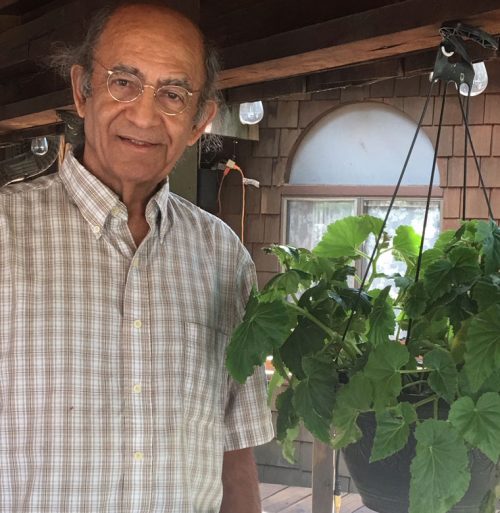
Photo by Holly Parsons
Violin virtuoso and recent Mountain Center resident Farhoud Moshfegh admits, “I collect beautiful instruments in an almost obsessive way. The history of the instruments and their players are etched in their veneer and tell a compelling story of each instrument’s journey. These represent stories I cherish.”
Moshfegh’s intriguing journey began in the walled Jewish ghetto in Arak, Iran where he was born. By age 9, he was selling cloth in the bazaar, ultimately becoming a wealthy businessman and one of Iran’s largest landowners. But the arts called to his heart and at age 19, he traveled to Munich to study violin, followed by several years playing in a chamber orchestra in Taiwan.
Continuing to follow his passion, Moshfegh graduated from the Belgium Royal Conservatory where he studied with violinist André Gertle, obtaining both a world-class education and an introduction to his future bride Dubravka, a fellow Croatian student.
Moshfegh went on to attend Budapest’s Bartok Seminar; and Salzburg, Goslar, Weimar and Siena masterclasses. He studied with A. Gerller, L. Basil, J. Laurent and W. Künig, with performances in Europe, the U.S. and Asia, and became a director of Vivace Ensemble and a member of Duo Affetuoso. The couple traveled extensively both living and performing all over the world.
But their favorite home, if only for a short time, was in one of Persia’s historic art centers, Tehran. The Islamic Revolution would soon derail the lives of countless Iranian artists including the Moshfeghs.
“I got a call that the committee wanted me to come in and explain some things,” he recalled. Knowing the execution of Jews and intellectuals had begun, they migrated to Newton, Massachusetts the following week. Moshfegh continued playing in orchestras while teaching violin at the New England Conservatory and raising three children, Sarvenaz, Ottessa and Darius.
“I was attracted to teaching. I think it’s a great pleasure to be presented with a blank canvas. Seeing everyday progress brings me great joy. I’ve even seen people confront psychological problems finding peace through music’s soulful expression. Learning an instrument is like a religion, you just go with it and it practically becomes your existence. It can become your life,” said Moshfegh.
“When I teach, I lose track of time. But seriously, magnetism comes from within for a violinist, and while I can excite the student or help them connect with something hidden, the truest talent comes from those with pure emotion for the work and for the audience.
“I think for a student to put a stamp on their work with personal interpretation requires forming a connection between a person’s soul and instrument, this can be attained by singing. The first thing I recommend to any instrumentalist is to sing in a chorus and to solo if possible.
“Singing connects the ear to what they want to deliver through their instrument. If they can sing musically, then they can play musically. You can play with your brain, but if you can use your brain to play through your heart … then you complete the circuit,” said Moshfegh.
Teaching violin at the New England Conservatory in Boston for 38 years led Moshfegh to a 15-year role as artistic director of Project STEP (string training education program), a National Arts and Humanities Youth Program.
The program began around 1980 when the Boston Symphony Orchestra, under the leadership of Personnel Manager Bill Moyer, began wondering why few people of color were trained in classical music to the degree required to participate in this world. Moyer thought the 103-member BSO looked like a club for white people and he made it his mission to change that.
Project STEP founders envisioned a world in which the classical music profession reflects the racial and ethnic diversity of our communities. Addressing this imbalance meant identifying talent and promoting rigorous professional musical development until students entered college.
Institutional sponsors include the Boston Symphony, the New England Conservatory and Boston University. Within 12 years, similar programs were operating in Pittsburgh, Dallas and Louisville. For more than 30 years, Project STEP is considered very successful, with the vast majority of graduates going on to college or conservatory.
Upon his retirement, Moshfegh’s eldest daughter Sarvenaz told her father, “I’d like to live somewhere in the rural West with some land I can farm.” Sarvenaz is a cellist, an accomplished actor and creator of a genre of survivor’s improv theater.
In April, Moshfegh with his daughter Sarvenaz and her two children, packed a U-Haul with a grand piano, 200 violins, 10 cellos, some furniture and paintings, and moved from Boston to Mountain Center. “My instruments have traveled with me for over 50 years,” he smiled. “One of my favorite occupations is the repair of violins. I’ve found violins in a hundred pieces and literally brought them back to life.”
Moshfegh will continue tutoring violin students in his new life. His musical favorites are Bach’s solo violin sonatas. “These are really like a violinist’s bible.” His short list also includes Mozart, Brahms and Beethoven. “I also enjoy playing works by the Hungarian composer Bela Bartok.”
He can be reached at [email protected].










